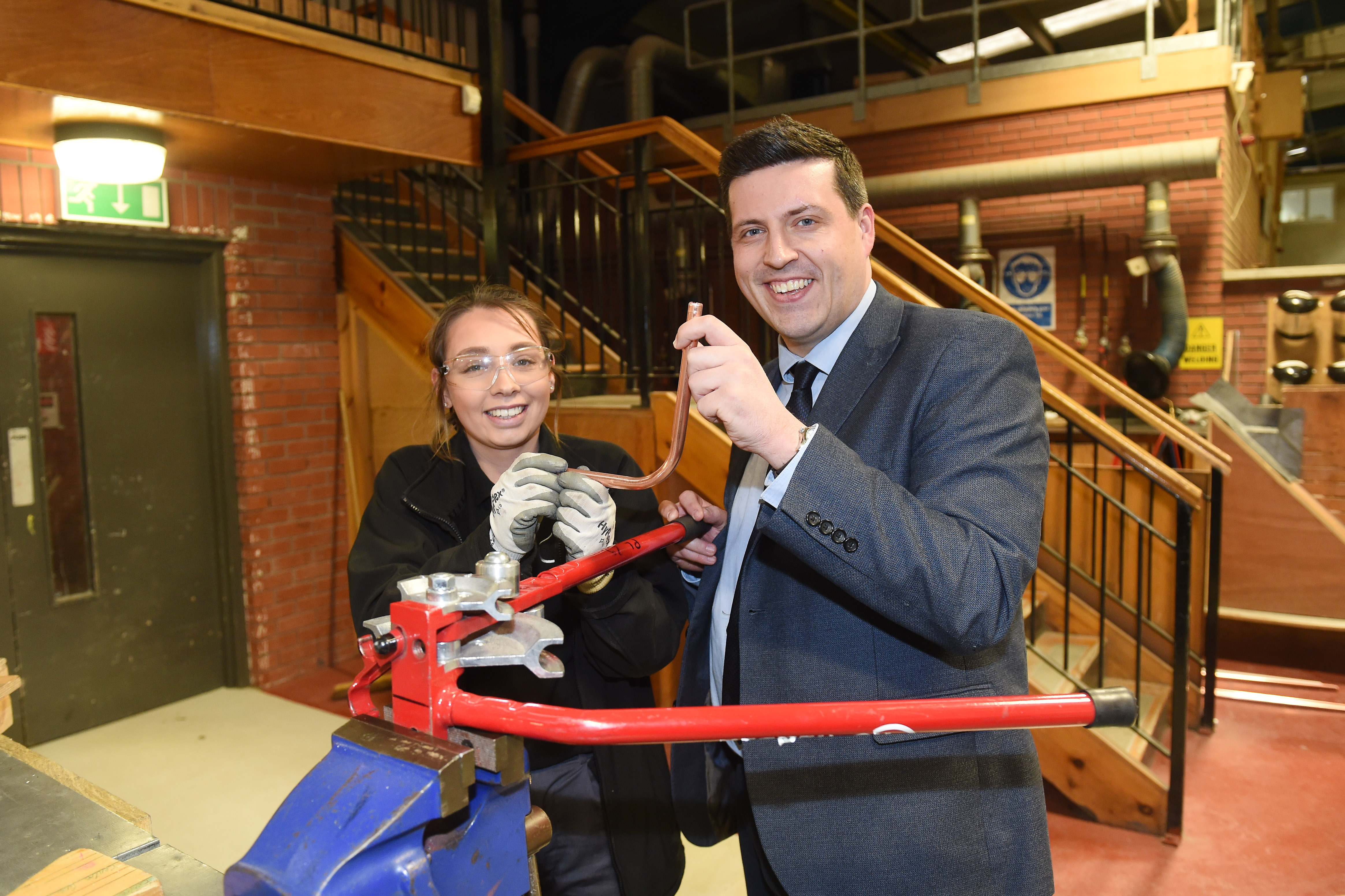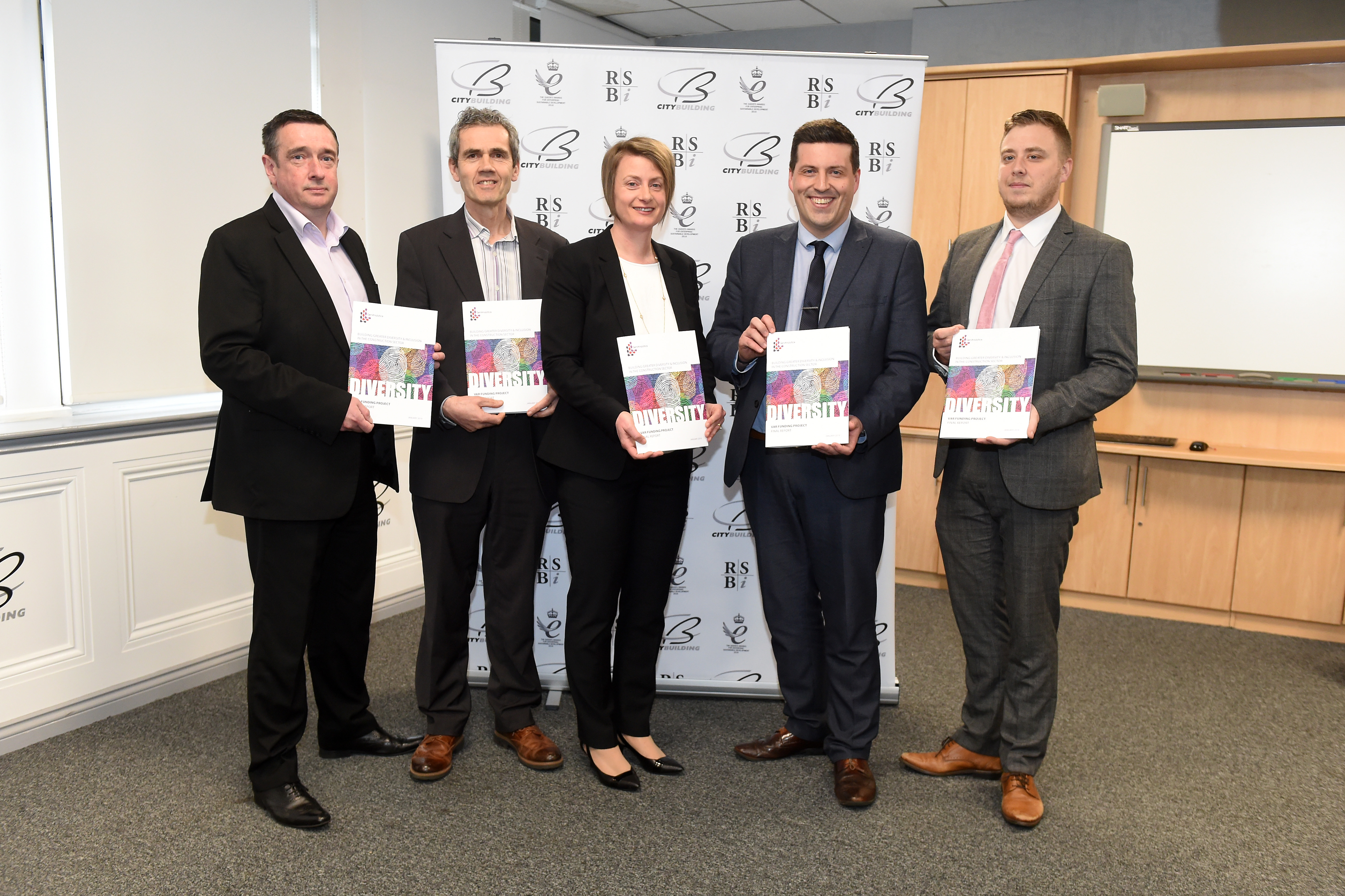Scottish Government calls on schools and employers to cooperate to address construction’s gender imbalance
Employers and education providers have been urged to join forces to showcase the job opportunities available in construction and attract a wider range of employees, including young women, into the sector.
Best practice training should also be made available to SMEs in the construction sector to help improve recruitment processes and make them fairer.

Employability minister Jamie Hepburn with City Building apprentices
The recommendations were among a range of measures identified by a new flagship Scottish Government report which was carried out to analyse and address a historic lack of diversity in the country’s construction industry.
Construction has been identified by the Scottish Government as one of the priority sectors to reduce inequalities, barriers to employment and discrimination. Across the UK, around 11% of the construction workforce is female with only 2% of female workers are employed in craft trade roles.
Published yesterday, the research was undertaken by GenAnalytics and funded by the Workplace Equality Fund, which was established by the Scottish Government to reduce employment inequalities, discrimination and barriers for ethnic minority people, women, disabled people and older workers.
It focused on Glasgow construction firm City Building’s supply chain of around 140 SMEs, following previous work to benchmark City Building’s diversity performance.
The six-month project commenced with an online survey that found that 83% of staff employed at City Building’s suppliers were male and 17% female, in line with national gender balance. Most of the companies – 47% - also did not employ staff from an ethnic background.

City Building apprentice Caitlin Dobson with employability minister Jamie Hepburn
During a series of workshops held with SMEs to explore the survey’s findings, employers said that construction needed to improve its image and acknowledged that it is often seen as the ‘last resort’ for youngsters who have been unable to secure other employment. They suggested that better relationships with schools and colleges could help to promote construction as a positive career choice.
In its report outlining the findings of the project, GenAnalytics made specific recommendations that could be implemented in the public sector to support SMEs in the construction to achieve greater diversity and inclusion.
Key amongst these was the importance of schools, colleges and universities working with employers to standardise engagement and educate young people about the opportunities available in construction.
A toolkit was also created to enable SMEs to develop and implement a diversity and inclusion strategy.

Ian Beale; Wolseley, Alex Weir; Spruce Carpets, Jane Gotts; GenAnalytics, employability minister Jamie Hepburn, Cllr Allan Casey; chair of City Building
Jane Gotts, director of GenAnalytics, said: “City Building does a huge amount of work to support an inclusive and diverse workforce, but realised that its suppliers needed support to attract a wider range of employees.
“What our research shows is that there are challenges around achieving this, but there is a willingness amongst SMEs to address the issues. We commend City Building for its leadership and hope this vital work can be replicated across other sectors.”
Cllr Allan Casey, chair of City Building, said: “We are very proud of our supply chain for stepping up and participating in this important research. As a business, supporting a diverse and inclusive workforce is at the forefront of our operations and we are keen to do all we can to assist our suppliers to achieve greater equality amongst their own workforces.”
Launching the report at City Building’s Queenslie Training Centre, employability minister Jamie Hepburn said: “Attracting and retaining a diverse workforce is a key priority in driving economic growth. That is why I welcome the GenAnalytics Construction report, funded by the Scottish Government’s Workplace Equality Fund into Building greater Diversity and inclusion in the construction sector. The Scottish Government is also committed to promoting a flexible, family-friendly working culture which aligns business success with a balanced work and family life.
“I’m pleased to announce that the Scottish Government will be providing continued support to Family Friendly Working Scotland with £159,000 of funding, in line with the aims of our forthcoming Gender Pay Gap Action Plan to promote fair work principles and the wider economic benefits these bring.”






















